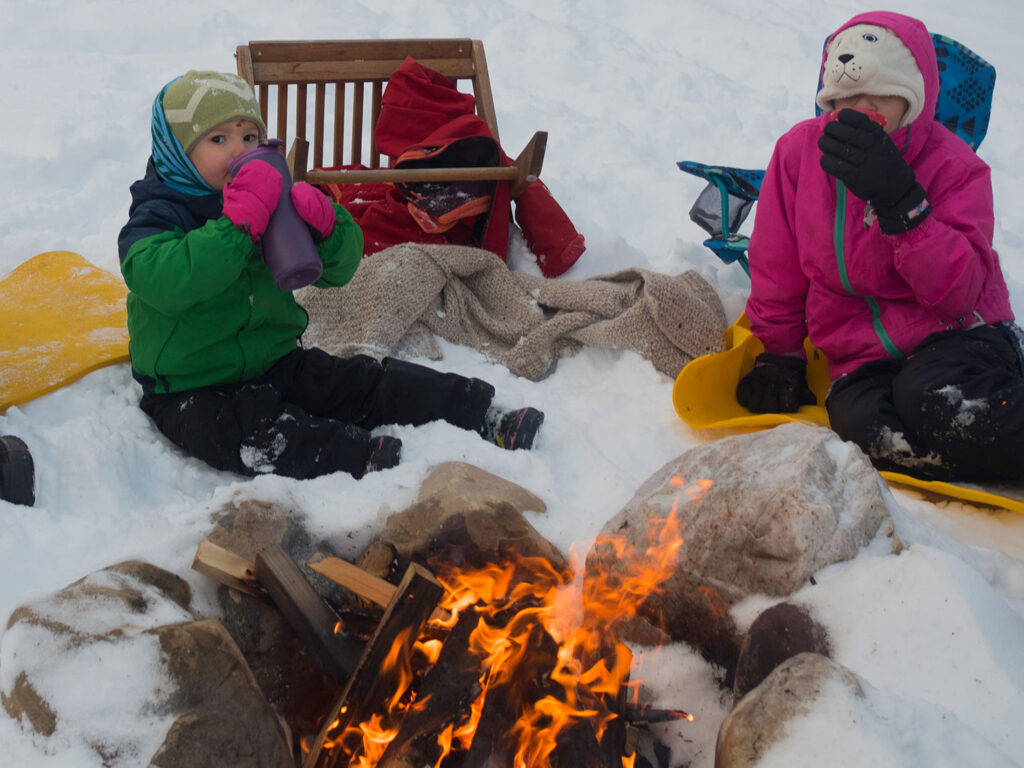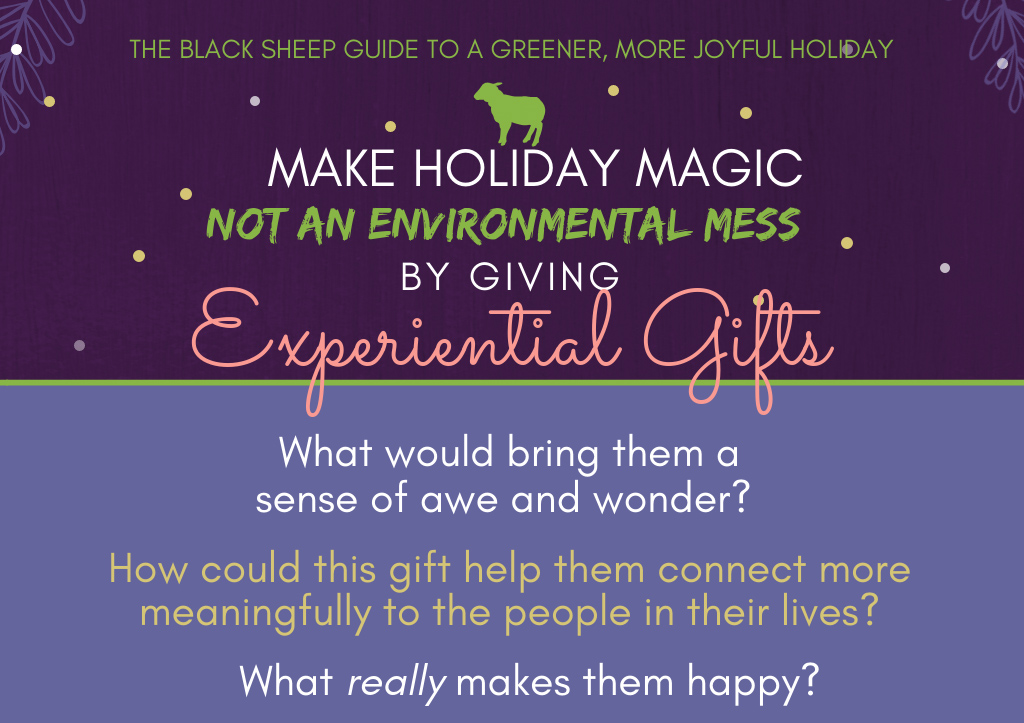Experiential Gifts Can Make Holiday Magic — Instead of an Environmental Mess
Ask yourself these three questions to ensure a great experience-as-gift for your family.
The joy on my kids’ faces as we tromp through the woods on our annual Christmas tree hunt is all the awesome we need.
Imagine wearing an outfit with humongous pockets. Throughout the day, you pick up everything you want or think you might need. By the end of the day, although you’ve collected all sorts of fascinating things, you can’t find the one thing you’re looking for.
This is how I’m starting to feel about December. In a fit of conspicuous consumption, we collect all the objects, treasures, and treats we can cram into our lives, but can’t seem to actually hold any of them in our hands.
In my last column, I mentioned that having more than we need can make us lose track of what’s most important. I want to shake December upside down until all the junk falls out: the plastic crap, the holiday Starbucks cups, and the blow-up Santa lawn decorations. (I’m on the fence about ugly Christmas sweaters.)
My kids are 18 months and 4 years old, so we’re still figuring out what we want the holidays to look like. Parenting has been a fascinating journey in this regard — there are so many habits and traditions I maintained unquestioned until considering whether I should pass them on to the kids (like lullabies about babies falling out of trees).
Gifts of experiences, although not “traditional,” allow us to go heavy on the love, while treading lightly on the planet.
Thoughtful presents passed between loved ones are part of the joy of the holidays. Out of habit, we assume these have to be material items wrapped in glossy paper. Gifts of experiences, although not “traditional,” allow us to go heavy on the love, while treading lightly on the planet.
I love seeing my kids’ eyes light up on Christmas morning. But I don’t love that the holiday has become a sparkly, sugary version of everyday capitalism. As plastic makes its way from Walmart, into our ecosystems, and then into our bodies, I’m sure as hell going to try to keep it out of the holidays. But I also won’t berate myself if all my kid wants is a magnetic plastic rescue vehicle set (which is sadly true). As Stephen Buranyi recently wrote in The Guardian,
To take on plastic is in some way to take on consumerism itself. It requires us to recognise just how radically our way of life has reshaped the planet in the span of a single lifetime, and ask whether it is too much.
Madeleine Somerville, author of All You Need is Less, is another parent determined to make the holidays more than a planet-trashing fiesta. Somerville, whose daughter Olive is 6, told me that during the holidays, our kids need to hear that “‘This is magic, and you are loved’. Does this come from one gift or 16?” She continues, “More stuff doesn’t make you happy… This is a lesson that Olive is learning, but it’s also an awareness most adults don’t have.”

A New Year’s Day backyard fire with neighbours, and hot chocolate, is a holiday tradition that helps my flock feel the magic of the season.
Somerville also says it’s important to recognize the privilege in discussions of the so-called “experiential advantage”: the idea that experiences can make us happier than material items do. Research suggests that “the ‘experiential advantage’ is not universal — the less well-off get equal or more happiness from buying things.”
If you’re interested in focusing more on non-material or experiential gifts this year, it could free up some time and energy for more smiling, snuggling, and simply enjoying the presence of your loved ones. Parents work hard enough at this time of year, so I came up with three questions to consider when deciding what experiences to give your loved ones.
1. What would bring them a sense of awe and wonder?
It’s been said the word “awesome” has been overused to the point of meaninglessness; we can address this linguistic tragedy by gifting experiences that are truly awesome. Researchers Dacher Keltner and Jonathan Haidt define awe as something that transforms us by inspiring huge emotions, and pushing our psychological boundaries; in doing so, it can lead to feelings of interconnectedness with others. A 2015 report published by the American Psychological Association confirmed that feeling awe can even reduce inflammation in the body.
Feeling awe can even reduce inflammation in the body.
Awe doesn’t require scaling mountains or going deep-sea diving. Watching the joy dance across my kids’ faces as we tromp through the woods on our annual Christmas tree hunt is all the awesome we need. That said, my dear friends at Kingmik Dog Sled Tours took my family out this weekend, and that was awe-inspiring as well. Some things to think about include:
- Finding the sublime in the outdoors: Skating, skiing, snowshoeing, interpretive walks, winter camping — the sky’s the limit (and on that note, add skydiving, a drive to a lookout, and suspension-bridge hiking).
- Visiting somewhere new and moving: A museum, an art gallery, a vast natural area you’ve wanted to explore.
- Being part of something bigger: UC Irvine professor Paul Piff says awe is related to “feelings that one is part of something greater than oneself.” So volunteer at a food bank, write letters to children experiencing long-term hospital stays, sign up to work on a Habitat for Humanity project, pitch in at a local ecological institute.
Taking photos and videos, journalling, and storytelling as a family after the event can help us bottle the awe for later.

A family mushing adventure with the company I once guided for filled us all with awe.
2. How can this experience help them connect more meaningfully to the people in their lives?
Melissa Leong, author of the upcoming book Happy Go Money (coming in January from ECW Press), knows the value of creating connection through sharing important things. According to the financial expert, “Experiences make us happier because experiences make us feel more connected to others, while material goods are usually enjoyed alone. You’ll also get more bang for your buck because experiences increase in value over time… you’ll get repeated joy every time you retell the story.” Research shows experience-based gifts get power from the fact that we we talk and share more about experiences than material items.
- Consider gift certificates for businesses or events that are different from your family’s routine: ice cream stores, rec centres, climbing walls, yoga studios, galleries, the theatre, concerts, the symphony, escape rooms.
- Family passes to fun-filled attractions can be practical and pretty great: a science centre, play/water parks, zoos, or wildlife rescue centres.
- If you’re an aunt/uncle/grandparent/chosen-family member, you’d be a parent’s dream if you took the kids somewhere they might never dream of. (For example, Somerville’s sister takes Olive to a trampoline park.) The kiddos (and parents) in your life will give you double thanks.
You’d be a parent’s dream if you took the kids somewhere they might never dream of.
3. What really makes them happy?
Sometimes what really makes those around us happiest is not what we expect. Little Grey Lamb’s biggest holiday wish is to play Lego all day. Lego is not my love language — because, plastic — but on Christmas afternoon, we will surround ourselves with tiny plastic bricks, because this is the experience he wants.
Researchers Paulina Pchelin and Ryan T. Howell point out that what makes us happy is not always rational — and pursuing the material items we think we should want might even keep us from happiness. It’s our hidden, inner world that determines our joy.
- Instead of asking your loved ones the generic, “What do you want for Christmas?”, you could ask, “What makes you smile?”, “If you could do anything as a family, what would it be?”, or “What are your favourite memories from last year?”
- Paying attention to the beautiful, irrational wishes of our family is the best gift. As Madeleine Somerville noted, “You do have to know your kid, what experiences they value and why.” When she asked her daughter what she wanted for her birthday, Olive said she’d love a night in a fancy hotel; this was the best gift, even though the answer was not what Somerville expected.

December can be a time when “heartbreak and the holiday spirit co-exist,” to quote my friend Mahalia Freed. Environmental devastation and political turmoil don’t stop just because there’s tinsel on the trees; our personal sadnesses and traumas can feel heavier during this time. All this on top of the pressure parents feel to create the “perfect” holiday season for our families. But if we fill our pockets with awe, connection, and happiness, we might just be able to find the things that really matter.
